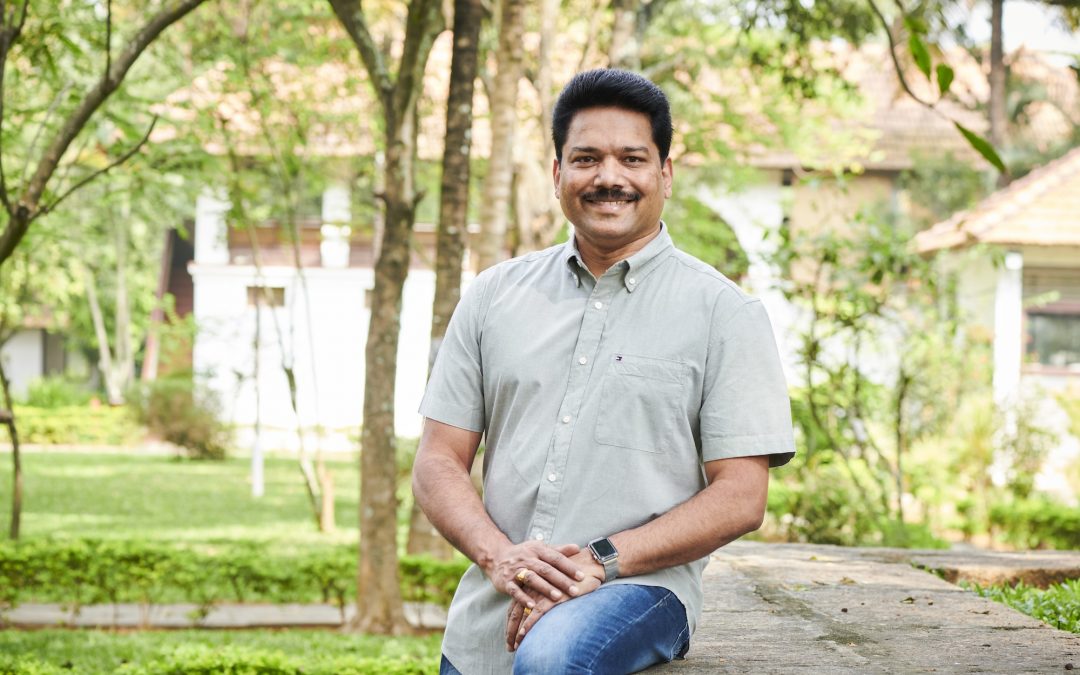Ayurveda as Integrated Healing for Wholeness
When we approach yoga, we often do so in a way that feels fractured — we lay out our mat, and it’s time for asana. We sit on our cushion, and it’s time for meditation. Even if we integrate other practices, such as Ayurvedic rituals before bed, we often think about them as separate to-dos that are to be checked off a list. According to SYF2024 presenter Vaidya. Jayarajan Kodikannath, BSc, BAMS, and Chief Ayurvedic Consultant & Academy Director of Kerala Ayurveda, however, we’re doing ourselves and the practices a disservice by thinking of them as separate activities. “What is lacking,” he says, “is the approach and application of yoga as a system. Yoga is a complete integration of an individual starting from the outer world to their inner world. The whole journey of an individual is yoga,” he says.
The honorary title “Vaidya” is a Sanskrit term for a non-codified Ayurvedic doctor who is a part of lineage of Ayurvedic practitioners in the community tradition of Kerala, Southern India, but as teacher and director as well as Ayurvedic practitioner, Vaidya. Jayarajan (known informally to his students as “Dr. J.” for short) brings more to the table — much like the understanding of Ayurveda itself.
Ayurveda is often called the sister science of yoga, and primarily associated with the physical self; a prescription for diet, medicine, physical wellbeing. Yet according to Dr. J., it’s much more than that. “It’s not a physically-oriented healing science,” he says. “It’s a science of life.” While we need our physical body for longevity, to clear out the karma accumulated and grow into a self-realized stage, Dr. J. says with a laugh, “Ayurveda covers the body, mind, and emotion. It’s a complete system of healing — physical, mental, emotional, spiritual — at all levels.” It’s a way to work toward continuous contentment, beyond just healing problems, like whack-a-mole, as they come up. Ayurveda, says Dr. J., is a way to stay healthy, harmonious, happy, and peaceful — no matter what challenges life throws your way.
What It Means to Be Harmonious
This all sounds well and good, but in today’s busy, stressed, and tragedy-heavy world, the idea of true harmony may feel like a pipe dream. And yet Ayurveda, and all the Vedic sciences, teach that we are, in fact, always in harmony with nature and the world around us. “The very definition of life in Ayurveda is that nature flows through you without interruption,” says Dr. J. “You are always in relationship with everything — including fellow human beings, animals, birds, plants, nature. Your sustenance is based on an in-sync relationship with nature and its rhythms,” he says. This is true whether we are aware of it or not. When we are aware of it, however, and intentionally living in awarenesses and pursuit of that connection, this is when we feel harmonious in it.
This doesn’t mean that we don’t feel pain or darkness. “The reality is that if there is daytime, there will be nighttime,” says Dr. J. “If there is hot summer, there will be cold winter. We must understand that everything is part of one — you cannot have only one aspect of existence.” What the Vedic sciences teach are ways to remain neutral, despite the fluctuations of the external world. “The ultimate state of human mind and emotion is to be able to accept not only the pluses, but the minuses too — and to stay neutral as a witness. From here we are able to be a part of positive changes for a shift in ourselves, our family members, our colleagues, our community. We are able to accept reality and make it better. And this is an individual’s dharma, or purpose,” says Dr. J.
Avoiding Spiritual Bypassing
The emphasis on positivity and creating positive shifts does not mean, however, that we don’t recognize or acknowledge the darkness. “The existence of this cosmos itself is in its disorder,” Dr. J. says. “There is no perfection.” But perfection is in the eye of the beholder — the only way we perceive something to be imperfect is through our mind’s perception. “We generally relate that more money means more happiness; or if I’m in a higher position, I’ll be happier; or if I’m in a good relationship, I’ll be happy. These are all human intellectually-created criteria to be happy. In reality, it is none of this — it is our frame of mind. Shifting that frame of mind is what we need, individually and collectively.”
Using Ayurveda to create the experience of inner harmony is exactly what participants can expect to learn from Dr. J. at the Sedona Yoga Festival this March. As we explore what it means to be All Together Now, Dr. J. will impart what it means to be one cell of the interconnected whole — that is, how we can take care of ourselves in order to be able to move from the whole heart and love others in that place of harmony and healing.
Experience this depth of wisdom and knowledge with Dr. J. this March. Passes are on sale now!


